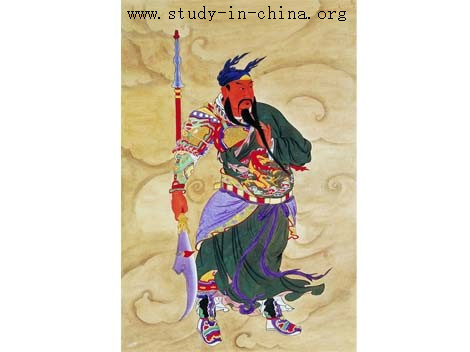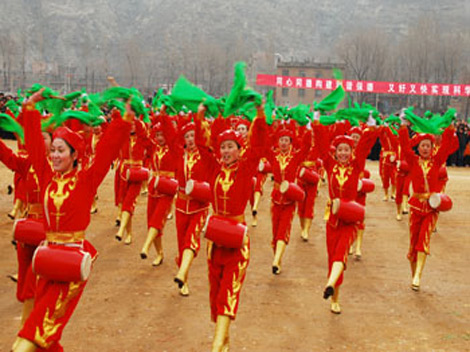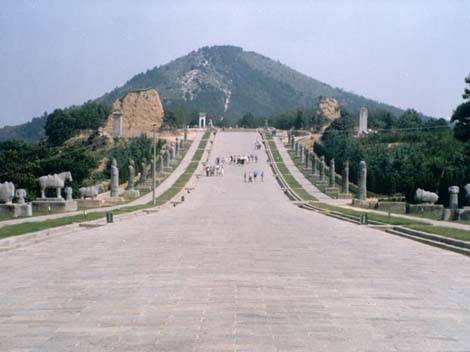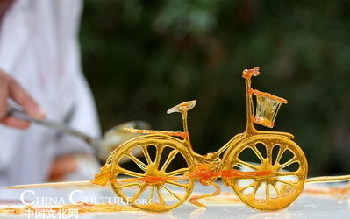| Home > China Feature |
Guan Yu - The Saint of Force
Guan Yu, whose date of birth was unknown and who died in the year 220, was a prominent general of the Shu Kingdom in the Three Kingdoms Period. The last years of the Eastern Han Dynasty witnessed a chaotic social order and the fighting of various military forces with one another. The three heroes Guan Yu, Zhang Fei and Liu Bei swore brotherhood and joined the political and military fights. At first, they settled in Cao Cao’s camp. Then having their own force, they founded the Kingdom of Shu against countless difficulties from an unnoticeable team to an influential kingdom. Finally, the Kingdom of Shu formed into a military force that was able to confront the Kingdoms of Wei and Wu, thus the well-known situation of the coexistence of Three Kingdoms took shape. History books have it that Guan Yu was brave and skillful in battle, outstanding in battle achievements, and loyal to his old master. At that time, Cao Cao thought highly of him and wanted to take Guan Yu into his service. He offered official posts and wealth for Guan Yu, trying to win him over by any means. Yet Guan Yu was not tempted. The only master he acknowledged was Liu Bei, his old master. What a loyal and valiant man! As time went by, Guan Yu’s merits were praised and exaggerated, especially in the famous historic novel The Romance of Three Kingdoms. In that book, his anecdotes were told vividly and finally became splendid stories known to every household. Take the story of Scrape the Poison off the Bone for example. It is told that Guan Yu was wounded by an arrow in a fierce battle, and when Hua Tuo, a well-known doctor in ancient China, treated his poisonous wound by curettage, Guan Yu was reading as usual instead of groaning painfully. Another story has it that he defeated the enemy’s general and took the latter’s head back and that the wine given by Cao Cao was still warm. In these stories, Guan Yu’s heroic and brave image was vivid and impressive. Features embodied by Guan Yu, loyalty, bravery, benevolence and faithfulness, accorded with the orthodox ideas of the ruling class, and were appreciated by common people as well. Therefore, he was commended by the following rulers of later dynasties and regarded as “the Saint of Force”, on parallel with Confucius “the Saint of Culture”. Gradually, Guan Yu was treated as a deity. On the traditional drama stage, he took a positive role with a red face and manly whiskers. In the past, there were many temples of Guan Yu of different scales throughout China. While people were singing praises for him, they wished that he could protect the local social order for them. So far, among people of Chinese origin all over the world, especially among merchants, the tradition of worshipping Guan Yu has remained. Perhaps it is because the features of loyalty and faithfulness embodied by Guan Yu tally with the way to do business
Art
 more
moreYicheng Hua Gu
The Flower Drum 花鼓 of southern Shanxi Province is a kind of folk d...

Sculpture in Qianling Mausoleum
The sculpture of Qianling Mausoleum is the main relic of the ground ...

A Sweet Art:Sugar Painting
In and around China’s southwestern Sichuan Province, it is usual to ...

Custom
 more
moreWeb Dictionary
Martial Arts
Wuxia, a Popular Culture for Most Chinese-Speaki...
Wuxia (武侠) is a broad genre of Chinese fiction that concerns its...
“Chinese Kung Fu Hot”
“Part the Wild Horse’s Maneton Both Sides”, “White Crane Spreads Its...
“Chinese Kung Fu Hot” in Alfred University
“Part the Wild Horse’s Maneton Both Sides”, “White Crane Spreads Its...





 print
print  email
email  Favorite
Favorite  Transtlate
Transtlate 







